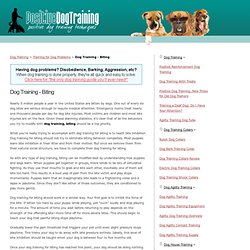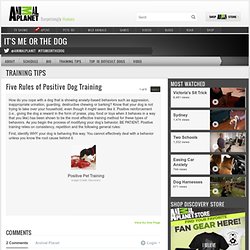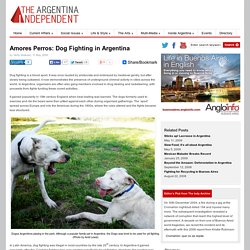

What to do if your dog eats cannabis. Pet adoption: Want a dog or cat? Adopt a pet on Petfinder. Positive Reinforcement Dog Training. Dog Training - Biting - PositiveDogTraining.org. Dog Training > Training for Dog Problems > Dog Training - Biting Nearly 5 million people a year in the United States are bitten by dogs.

One out of every six dog bites are serious enough to require medical attention. Emergency rooms treat nearly one thousand people per day for dog bite injuries. Most victims are children and most bite injuries are on the face. Given these alarming statistics, it's clear that of all the behaviors you try to modify with dog training, biting should be a top priority.
What you're really trying to accomplish with dog training for biting is to teach bite inhibition. As with any type of dog training, biting can be modified best by understanding how puppies and dogs learn. Dog training for biting should work in a similar way. Gradually lower the pain threshold that triggers your yell until even slight pressure stops playtime. Once your dog training for biting has reached this point, your dog should be doing nothing more than "mouthing. " Positive Dog Training - Benefits of Positive Reinforcement Training for Dogs.
Victoria's Positive Dog Training : It's Me or the Dog. How do you cope with a dog that is showing anxiety-based behaviors such as aggression, inappropriate urination, guarding, destructive chewing or barking?

Know that your dog is not trying to take over your household, even though it might seem like it. Positive reinforcement (i.e., giving the dog a reward in the form of praise, play, food or toys when it behaves in a way that you like) has been shown to be the most effective training method for these types of behaviors. As you begin the process of modifying your dog’s behavior, BE PATIENT. Positive training relies on consistency, repetition and the following general rules: First, identify WHY your dog is behaving this way. Positive Pet TrainingImage Credit: Discovery Tip #2: How Once you know the WHY, then you can ask yourself HOW to treat the behavior. Positive Pet Training Tip #3: Think Dog Learn to talk and think dog.
Tip #4: Be Kind Be kind! Tip #5: Go Slowly Go very slowly when dealing with anxiety-related behaviors. Amores Perros: Dog Fighting in Argentina. Dog fighting is a blood sport.

It was once lauded by aristocrats and embraced by medieval gentry, but after slowly being outlawed, it now demonstrates the presence of underground criminal activity in cities across the world. In Argentina, organisers are often also gang members involved in drug dealing and racketeering, with proceeds from fights funding these covert activities. It gained popularity in 19th century England when bear-baiting was banned.
The dogs formerly used to exercise and rile the bears were then pitted against each other during organised gatherings. The ‘sport’ spread across Europe and into the Americas during the 1800s, where the rules altered and the fights became less structured. Dogos Argentinos playing in the park. In Latin America, dog fighting was illegal in most countries by the late 20th century. Some Latin American countries, however, do not have official laws prohibiting the practice of dog fighting. Cumberland County Animal Control: Drop the 72-hour-kill proposal. I just signed the following petition addressed to: Cumberland County Animal Control.
----------------Drop the 72-hour-kill proposal I am writing today to express my grave concern regarding your breed ban proposal by enacting a 72-hour-kill plan in Cumberland County Animal Control in Fayetteville, NC, to affect all Dobermans, Rottweilers, Chow Chows, German Shepherds, Great Danes, Pitbulls,... I am writing today to express my grave concern regarding your breed ban proposal by enacting a 72-hour-kill plan in Cumberland County Animal Control in Fayetteville, NC, to affect all Dobermans, Rottweilers, Chow Chows, German Shepherds, Great Danes, Pitbulls, Mastiffs (all bully breeds), Akitas, and Huskies. This “vicious dog” or “BSL” ordinance illegalizes the ownership of the particular dog breeds named, the reason for which is to prevent any liability for injuries before or after a state in the shelter even though a simple waiver would prove sufficient regarding that concern. With due respect,